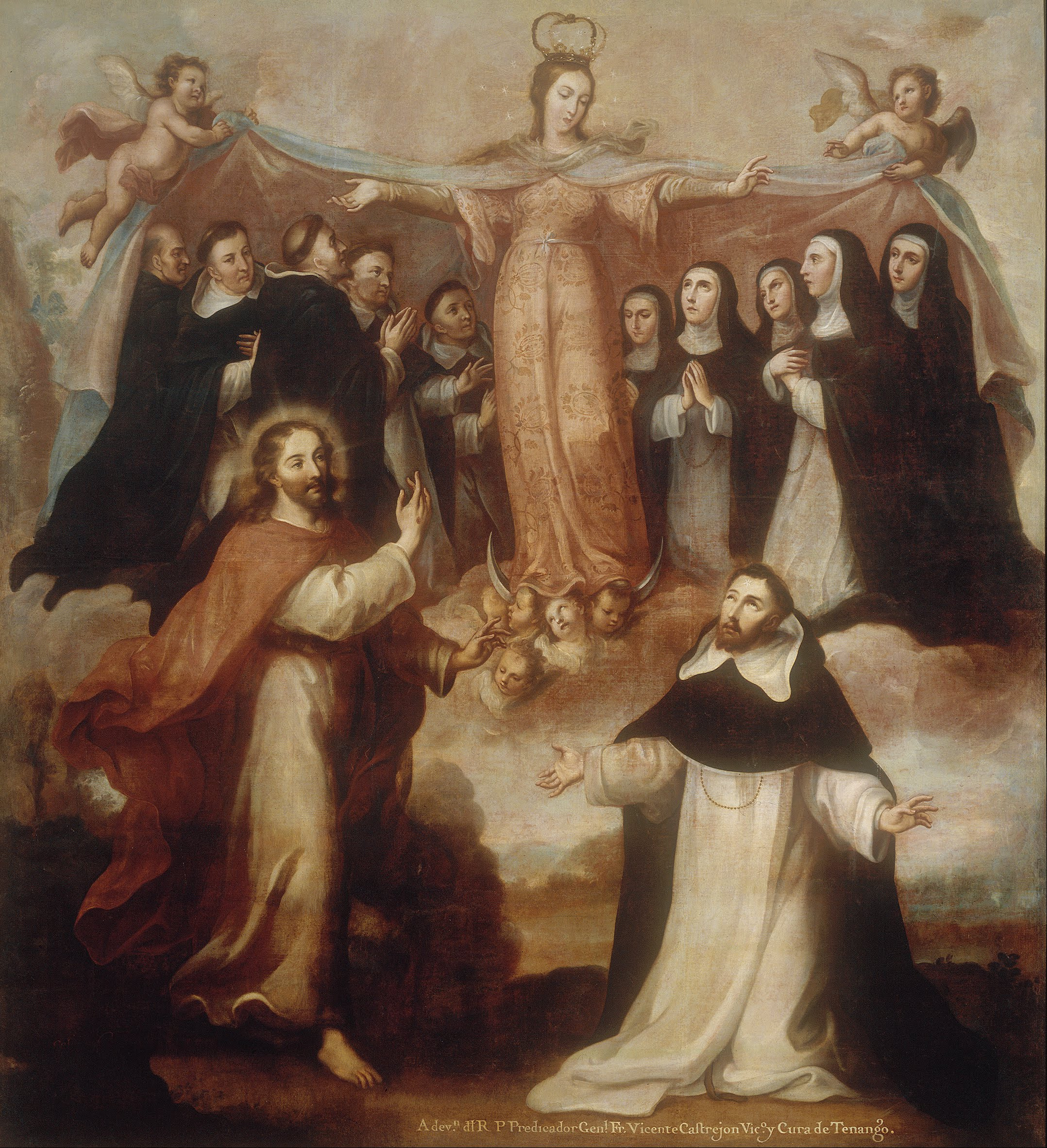Miguel Cabrera (1695–1768).
Alegoría de la Virgen protectora de los dominicos, Museo Nacional de Arte
Blessed Henry of Cologne, OP (PC)
Died in Cologne, Germany, 1224 or 1225. One of the first Dominicans recruited
from among the students of the university of Paris, Henry became the first
prior of the friary at Cologne. He was the closest friend of Blessed Jordan of
Saxony, who knew, understood, and promoted friendships as important to the
spiritual life. Henry met Jordan when the latter was a professor at the
University of Paris. Henry must have been a very personal young man of fine
character, for Jordan named him the very flower of the Dominicans. He was
"handsome, reverent and virtuous, of a mind to grasp everything and with a
rare faculty for expressing himself."
When Reginald of
Saint-Gilles died, Jordan had a vision in which he saw in the cloister of
Saint- Jacques a clear and limpid fountain that ran dry. In its place a
fountain sprang up, having two heads, surging up like a great river to water
the whole earth. It was revealed to him that Henry was one of the
fountainheads, and the brethren easily understood that Jordan himself was the
other.
By this time Jordan
had decided to abandon his academic career and join the Dominicans. But he
could not bring himself to leave behind his dearest friend. Often he would
later say in sermons, "You do not go to a banquet alone, but with your
dear friends; you should not go alone to heaven either!" Jordan's success
in recruiting young men for the order is probably due to this attitude. He
could not imagine anyone going into the joy of religious life without bringing
his friends along with him. So Jordan delayed entering the order until Henry
was ready to do so, too.
After Henry
completed his studies in the arts and theology in Paris, Jordan began
recruiting him. When Jordan returned from confession to Reginald, shaken and
exalted by the ideals that Reginald had envisioned for him, he looked for and
found a Scripture text to confirm his resolution. Then the book fell open to
the text he wanted for Henry, "Let us stay together, let us never
separate." He urged this on Henry, but the young man, who was chaste and
obedient, found it difficult to accept poverty.
Henry argued with
himself, prayed and meditated, but still was unable to accept the precept of
abandoning all things for the uncertainties of a mendicant life. One night,
after he had prayed for a long time, he saw himself at judgement, and a
thunderous voice demanded of him, "And you--what have you given up for
God?" Henry was shaken by this thought, went to see Master Reginald, and
resolved to enter the order as soon as possible. On Ash Wednesday, 1220, the
two friends went together to be received.
Jordan, a magnetic
preacher, thought that Henry was the model of preachers. Our image of Henry is
highly idealized because the only records remaining are those written by
Jordan. In 1221, when the priory of Cologne was established, Henry was sent
there as prior, and Jordan went to Lombardy. It was a sorrow to see the friends
separated, but they wrote frequently. Theirs was a friendship based on the love
of God and directed to the furthering of His kingdom.
At about the age of
35, Henry died suddenly in the arms of Jordan, who was visiting Cologne. It was
a terrible grief to Jordan, and his letter concerning the death of Henry is one
of the saddest and most beautiful of all his eloquent writings. He writes to
Blessed Diana in the rawness of his sorrow, "Do not grieve too much about
the death of your sister Otta . . . it is good for us to be saddened now at the
same time, to go sowing our seed in tears; at the harvest we shall come
carrying our sheaves in joy." Jordan confesses that he wept copiously for
his friend and, after giving a beautiful account of the last moments of Henry,
he adds, "There is still a long way to go. If you are tired, your Jesus
was also . . . in all humility, in all patience, He knew how to wait"
(Benedictines, Dorcy).
SOURCE
: http://www.saintpatrickdc.org/ss/1023.shtml
Blessed Henry of Cologne
Blessed Henry of Cologne
5 August 2013,
6:18 pm
Profile
Studied
at the University of Paris. One of the first Dominicans.
First prior
at Cologne, Germany.
Friend of Blessed
Jordan.
